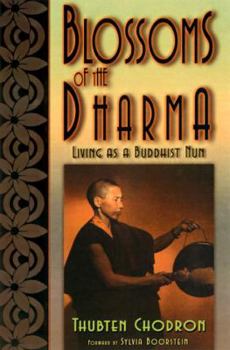Blossoms of the Dharma: Living as a Buddhist Nun
Blossoms of the Dharma assembles the voices of fourteen nuns from all the major Buddhist traditions who speak about their lives, the history of the Nun's Order, and their experiences within their own... This description may be from another edition of this product.
Format:Paperback
Language:English
ISBN:1556433255
ISBN13:9781556433252
Release Date:December 1999
Publisher:North Atlantic Books
Length:206 Pages
Weight:0.85 lbs.
Dimensions:0.6" x 6.0" x 9.0"
Customer Reviews
3 ratings
Monastic & cultural differences, adaptations, & experiences
Published by Thriftbooks.com User , 19 years ago
This insightful book has 14 chapters based on "Life as a Buddhist Nun," a 3 week educational program for nuns @ Bodhgaya, India, Feb. 1996. The authors are from numerous countries, mostly European. Major sections include: history & monastic discipline, living as a Buddhist nun, nun's teachings, and a poignant appendix: p. 187: Bhikshuni Tenzin Palmo (England) "The Situation of Western Monastics," which made the Dalai Lama weep and an interview with the him in which he stated, pp. 192-3: "I think the rights of women practitioners in the Tibetan Buddhist community have been neglected." There are many references to cultural differences between East and West and the need to adapt: p. ix: Dalai Lama: "Wherever Buddhism has taken root in a new land, there has always been a certain variation in the style in which it is observed. p. xxxiv: editor Bhikshuni Thubten Chodron (USA): "Western monastics must determine how to keep some of the precepts according to the society and situation in which they find themselves. When Buddhism spread from India to Tibet, China, and other countries, the way of keeping the precepts was also adjusted to fit the mentality of the society as well as the geography, climate, economics, and so on of the country. This process is only beginning in the West now." pp. 7-8: Bhikshuni Lekshe Tsomo (Hawaii), "Buddhist Monasticism & its Western Adaptation"--"Differences in social conditions now and at the time of the Buddha require thoughtful adaptation of the precepts in the present day." p. 19-21: Dr. Chatsumarn Kabilsingh (Thailand) "The History of the Bhikkhuni Sangha"--"The Buddha always made exceptions after the general rule was established...Questioning the authority of certain passages in the Buddhist scriptures is a delicate issue, and we have to be very careful. How can we prove that everything was passed down exactly as the Buddha spoke it? On the other hand, isn't there a danger in saying that certain passages are later interpolations? I become suspicious only when a passage does not correspond with the spirit of the main core of the Buddha's teachings." p. 31: Kabilsingh: "Certain ancient Indian social values were taken into Buddhism, because the Buddhist community was not separate from the general Indian society at the time." p. 117: Chi-Kwang Sunim (Australia), "A Strong Tradition Adapting to Change: The Nuns in Korea"--""Westernization and technology are not the problem; what we do with them is." pp. 141-2: Thubten Chodron "Finding Your Way"--"What is the essence of the Buddha's teachings that we must practice, bring back to our Western countries, and teach others? What is cultural form that we need not bring to the West? ...I had to confront the fact that copying a cultural form and others' external behavior was not necessarily practicing the Dharma...Because most of us Western monastics are operating cross-culturally, we would benefit from adapting the positive aspects and values of all culture we contact,
Some Interesting Essays
Published by Thriftbooks.com User , 23 years ago
This book was the fruit of a conference of female ordained Buddhist monastics. Like all essay collections, this is a mixed bag, but contains at least three or four very interesting chapters. The book is organized into two main sections. The first is a series of essays by Buddhist nuns from different monastic traditions--Zen, Theravadin, Tibetan Kagyu, etc. They describe the routine in their monasteries, the rhythm of collective life. This section begins with an excellent article by Professor Chatsumarn Kabilsingh of Bangkok on "The History of the Bhikkhuni Sangha." She raises some interesting points concerning the historical Buddha's efforts to improve the status of the nuns (bikshunis) in relation to the monks (bikshus). The second section consists of brief dharma teachings by some of the nuns. Most notable is an essay by Khandro Rinpoche, a female Tibetan tulku and daughter of the head of the Mindrolling lineage. Another very good essay is about "How to Rely On A Spiritual Teacher" by Bhikshuni Jampa Chokyi, from Spain.
A complete eye-opener
Published by Thriftbooks.com User , 24 years ago
These essays shine with intelligence and compassion. They also fill in so many little details about nuns' lives, dreams, obstacles and the work ahead. I was stunned by the book's vivid descriptions and its practical approach to everyday problems. Buddhist nuns are regular people, of course, but have focused their energy on the monastic discipline which supports a solid spiritual way of life. The essays break these things down, giving them a human face, a view of spiritual matters in perspective. Most of all, the book imparts a precious gift - an opportunity to imagine what it would be like. We can all rejoice.





